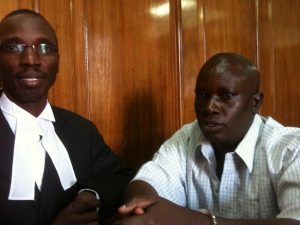
Press Release: 'Hundreds Saved from the Death Penalty in Kenya - Court Rules Mandatory Death Penalty for Murder to be Unconstitutional
- News
- 30 Jul 2010
In a landmark judgment, the Court of Appeal of Kenya today declared unconstitutional the application of a mandatory death sentence on all prisoners convicted of murder.
In their unanimous judgment, the Court of Appeal ruled that the automatic nature of the death penalty in Kenya for murder violates the right to life and amounts to inhuman punishment, as it does not provide the individuals concerned with an opportunity to mitigate their death sentences. As a result, hundreds of prisoners currently on death row in Kenya, including the Appellant, Godfrey Mutiso, will fall to be re-sentenced in accordance with the new law. The Court of Appeal said that the same reasoning given in the judgment would apply to other offences having a mandatory death sentence, such as treason and robbery with violence (section 296/2 Penal Code).
A new set of procedures will now have to be adopted to ensure that sentence hearings takes place and a judge will now have the discretion to consider what sentence to impose after hearing evidence in mitigation. The death penalty is now to be the maximum sentence, but not the only sentence.
The Court of Appeal also came out strongly against the death row phenomenon, stating that holding a person on death row for more than 3 years would be unconstitutional.
Timothy Bryant and William Wameyo, both Kenyan Advocates represented Mr Mutiso on a pro bono basis in the Court of Appeal. They were assisted by the staff of CLEAR Trust. They have been assisted by a team of UK lawyers comprising of Saul Lehrfreund MBE and Parvais Jabbar (Executive Directors of the Death Penalty Project) and Joseph Middleton of Doughty Street Chambers. They travelled to Kenya on a number of occasions before the hearing to co-ordinate the case and assisted with the drafting of legal arguments. In addition, they attended the hearings in the Court of Appeal.
Saul Lehrfreund MBE and Parvais Jabbar, human rights lawyers and Executive Directors of the Death Penalty Project state:
The cases of many prisoners on death row in Kenya will now have to be reviewed. The implications for future murder trials will be the introduction of a completely new set of procedures restricting the imposition of the death penalty in the first instance. We are delighted that the jurisprudence from Uganda, Malawi and other regions in the world has now been accepted in Kenya. It also reflects an emerging trend seeking to restrict the application and scope of the death penalty. We hope this decision will be adopted in other countries in East and West Africa where the mandatory death penalty is still in operation.
Notes to Editors
1. The Death Penalty Project is an international human rights organisation housed in the offices of Soho legal firm Simons Muirhead & Burton, providing free legal representation to many individuals still facing the death penalty in the Commonwealth. The organisation receives generous support from the Sigrid Rausing Trust, the Oak Foundation, the UK Foreign & Commonwealth Office, the United Nations Voluntary Fund for Victims of Torture and by a grant from the Foundation of the Open Society Institute. 2. Joseph Middleton is a Barrister at Doughty Street Chambers and was instructed and advised pro bono. 3. The CLEAR Trust is a trust registered in Kenya whose goals are to provide legal education, assistance and representation to Kenyans who cannot afford access to justice. CLEAR has four offices in Kenya based in Mombasa, Nairobi, Eldoret and Kisumu and is a project of the Kenya Christian Lawyers Fellowship. Lawyers have been providing free legal services to CLEAR for the last ten years. 4. For further information please contact Saul Lehrfreund or Parvais Jabbar, Executive Directors of the Death Penalty Project Ltd at Simons Muirhead & Burton or Joseph Middleton at Doughty Street Chambers.




















